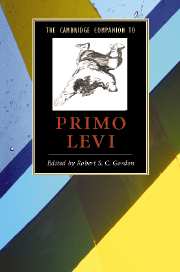9 - Primo Levi’s humour
from Part IV: - Language and Literature
Published online by Cambridge University Press: 28 November 2007
Summary
“'If I were asked to define the writer in a single word, I would say he was a humorist.'”
(Massimo Mila)'Argon', the story which opens The Periodic Table (Il sistema periodico, 1975), contains an important and often-quoted digression. While sketching the history of the Jews in Piedmont, and the mixture of Piedmontese dialect and Hebrew expressions used in the various communities, Levi points out that what makes this mixture funny is the intrinsic cultural and structural contrast between the two languages. From there he goes on to identify contrasts and conflicts as a central component of all Diaspora Jewish cultures and their humour; and then he generalizes even further, attributing contrasts to all human nature, and therefore - implicitly - to all humour:
It [Jewish-Piedmontese] contains an admirable comic force, which springs from the contrast between the texture of the discourse, which is the rugged, sober, and laconic Piedmontese dialect . . . and the Hebrew inlay, snatched from the language of the fathers, sacred and solemn . . . [T]his contrast reflects another, the essential conflict of the Judaism of the Diaspora . . . torn between their divine vocation and the daily misery of existence; and still another, even more general, the one which is inherent in the human condition, since man is a centaur, a tangle of flesh and mind, divine inspiration and dust.
(The Periodic Table, p. 9; OI, 746)The assertion that to be a human being is to be a tangle (groviglio) of incompatible elements which cannot be reconciled seems partly to contradict another of Levi's frequently quoted statements, that his writing is a deliberate progression 'from darkness to light'. The notion of linear movement towards the 'light' has been consistently refuted by Levi research in the past ten years: scholars have revealed the complexities within his work, providing insights into his ambivalent views on communication, science, writing, Jewishness and more.
- Type
- Chapter
- Information
- The Cambridge Companion to Primo Levi , pp. 137 - 154Publisher: Cambridge University PressPrint publication year: 2007
- 2
- Cited by



